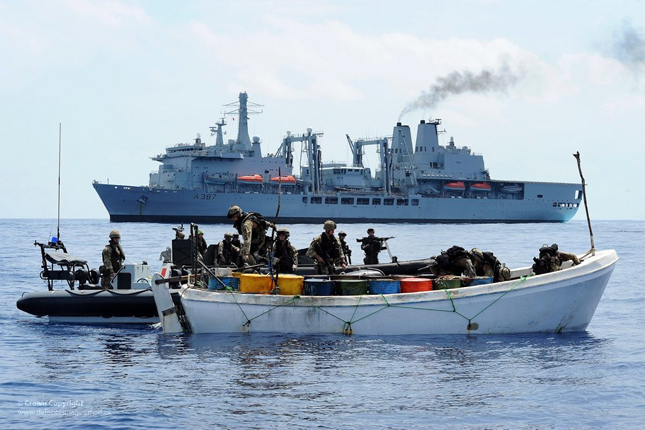-
Shannon Beebe, Los Angeles Times
Somali Piracy Shows How an Environmental Issue Can Evolve Into a Security Crisis
March 14, 2011 By Wilson Center Staff
It has become apparent that real piracy is far different from the lighthearted subject sometimes portrayed in popular culture, and the problem is growing much worse. Besides the tragic cost in lives, the United States, many other nations, and NATO spent roughly $2 billion combined last year to safeguard the busy international sea lanes off the Horn of Africa from Somali pirates. According to the International Maritime Bureau, “hijackings off the coast of Somalia accounted for 92 percent of all ship seizures last year,” and the price tag does not include the costs of reallocating critical military resources.
Sadly, much of this could have been avoided had the world made a stronger commitment to conservation and environmental protection years earlier. Somalia provides a classic example of how problems related to poverty and the environment are increasingly evolving into traditional international security risks.
For example, the issue of overfishing, particularly by foreign vessels, was very low on the international community’s radar when the government of Somalia collapsed in the 1990s. The combination of rich fishing opportunities and a complete inability of the government to police its waters drew fleets from countries far and near, setting the stage for the instability to come. The greatest harm was done by European and Asian vessels that plundered the fisheries off Somalia’s coast.
Once Somalia’s fish populations were depleted, the international ships moved on. But local fishermen obviously could not. As economies along the coast collapsed, whole communities of Somalis became jobless, hungry, and willing to exploit the only assets they had: boats with a strategic launching point into one of the world’s most important commercial sea lanes. And what would have seemed unthinkable to many Somali villagers just a short time before — transforming small fishing boats into pirate vessels — has since become a way of life.
Continue reading on The Los Angeles Times.
For more on Somalia’s myriad environmental and security issues, see New Security Beat’s “As Somalia Sinks, Neighbors Face a Fight to Stay Afloat.”
Shannon Beebe is a lieutenant colonel in the U.S. Army and co-author of The Ultimate Weapon Is No Weapon: Human Security and the New Rules of War and Peace. The opinions expressed here are his own and do not represent those of the Department of Defense.
Sources: International Maritime Bureau, Maritime Domain Awareness Information Exchange.
 A Publication of the Stimson Center.
A Publication of the Stimson Center.



